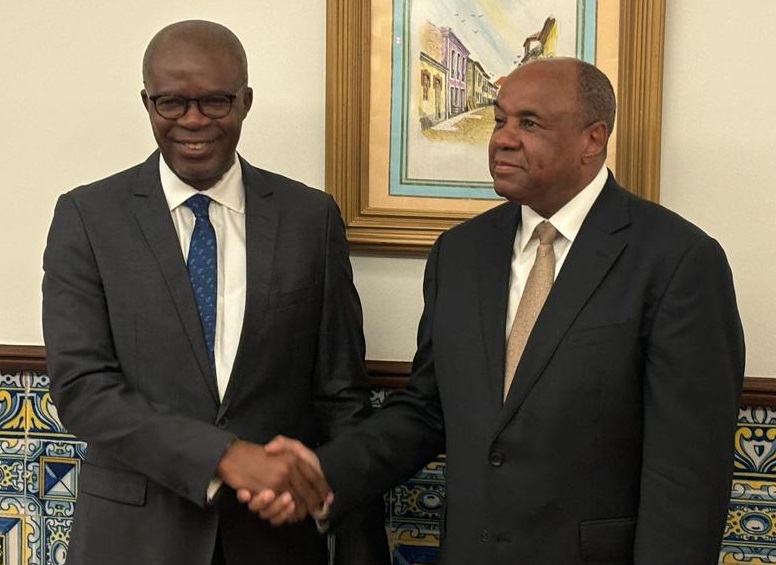Better payment tools to boost trade
Namibia, Angola brainstorm
Measures taken this week by the Bank of Namibia (BoN) and the Banco Nacional de Angola (BNA) have boosted the issuance and use of payment mechanisms between the two countries in response to the need to smoothen trade-related transactions and thereby facilitate trade.
BoN governor Johannes !Gawaxab paid a one-day visit to his Angolan counterpart, Manuel Dias, this week as part of a renewed push by the two central banks to enhance the movement of goods and services between the two neighbouring countries, stemming from solid government-to-government relations.
Payment systems include a variety of platforms and services that enable businesses, individuals, the government and other economic agents to conduct daily financial transactions without the need to use cash.
Payment mechanisms
To this end, the central banks explored various payment mechanisms to enhance trade between the two countries, the BoN said in a statement.
These instruments included credit and visa cards and electronic fund transfers (EFT), which are crucial in the commercial world as they enable businesses and consumers to transfer funds to one another.
Non-resident accounts linked to a card product, which were only issued on a limited basis in Namibia, are now available at most commercial banks for Angolan citizens. These are also available to Namibian citizens traveling to Angola.
In addition, the popular Multicaixa cards used in Angola will soon be VISA/Mastercard branded, which opens another avenue for Angolan citizens traveling to Namibia to use conveniently.
Kwanza
Angola has made steady progress in on-boarding its kwanza currency on the cross-border real-time gross settlement system (RTGS) in the Southern African Development Community (SADC), the BoN said.
This will open another avenue for high-value payments to be effected between the two countries.
Commenting on his trip, !Gawaxab said: “Our cooperation should not only be transactional but also transformational and as a beacon of hope illuminating the path for an interconnected future for Namibia and Angolan current and future generations.”
Dias reaffirmed that the journey of a thousand miles starts with a single step: “With the measures taken today by the Banco Nacional de Angola and the Bank of Namibia, our two countries are one step closer to realising regional integration in line with the objectives set out by the African Unions’ Agenda 2063. Furthermore, these steps will significantly strengthen the longstanding bilateral relationship between Angola and Namibia.”
Research
The two central banks announced a raft of research activities to be undertaken this year by technical teams of the two monetary authorities on trade-related topics to inform policymakers and other stakeholders on untapped trade opportunities between the two countries and financial inclusion, among others.
The BoN and the BNA continue to advance modern and digitally driven payment methods between their respective countries while improving exchange control systems that promote trade and safeguard the stability and soundness of their financial systems.
“The central banks will persist in raising awareness among their stakeholders regarding these payment initiatives and continue exploring additional measures to augment collaboration and economic advancement for both nations further,” the BoN said.
BoN governor Johannes !Gawaxab paid a one-day visit to his Angolan counterpart, Manuel Dias, this week as part of a renewed push by the two central banks to enhance the movement of goods and services between the two neighbouring countries, stemming from solid government-to-government relations.
Payment systems include a variety of platforms and services that enable businesses, individuals, the government and other economic agents to conduct daily financial transactions without the need to use cash.
Payment mechanisms
To this end, the central banks explored various payment mechanisms to enhance trade between the two countries, the BoN said in a statement.
These instruments included credit and visa cards and electronic fund transfers (EFT), which are crucial in the commercial world as they enable businesses and consumers to transfer funds to one another.
Non-resident accounts linked to a card product, which were only issued on a limited basis in Namibia, are now available at most commercial banks for Angolan citizens. These are also available to Namibian citizens traveling to Angola.
In addition, the popular Multicaixa cards used in Angola will soon be VISA/Mastercard branded, which opens another avenue for Angolan citizens traveling to Namibia to use conveniently.
Kwanza
Angola has made steady progress in on-boarding its kwanza currency on the cross-border real-time gross settlement system (RTGS) in the Southern African Development Community (SADC), the BoN said.
This will open another avenue for high-value payments to be effected between the two countries.
Commenting on his trip, !Gawaxab said: “Our cooperation should not only be transactional but also transformational and as a beacon of hope illuminating the path for an interconnected future for Namibia and Angolan current and future generations.”
Dias reaffirmed that the journey of a thousand miles starts with a single step: “With the measures taken today by the Banco Nacional de Angola and the Bank of Namibia, our two countries are one step closer to realising regional integration in line with the objectives set out by the African Unions’ Agenda 2063. Furthermore, these steps will significantly strengthen the longstanding bilateral relationship between Angola and Namibia.”
Research
The two central banks announced a raft of research activities to be undertaken this year by technical teams of the two monetary authorities on trade-related topics to inform policymakers and other stakeholders on untapped trade opportunities between the two countries and financial inclusion, among others.
The BoN and the BNA continue to advance modern and digitally driven payment methods between their respective countries while improving exchange control systems that promote trade and safeguard the stability and soundness of their financial systems.
“The central banks will persist in raising awareness among their stakeholders regarding these payment initiatives and continue exploring additional measures to augment collaboration and economic advancement for both nations further,” the BoN said.





Kommentar
Allgemeine Zeitung
Zu diesem Artikel wurden keine Kommentare hinterlassen